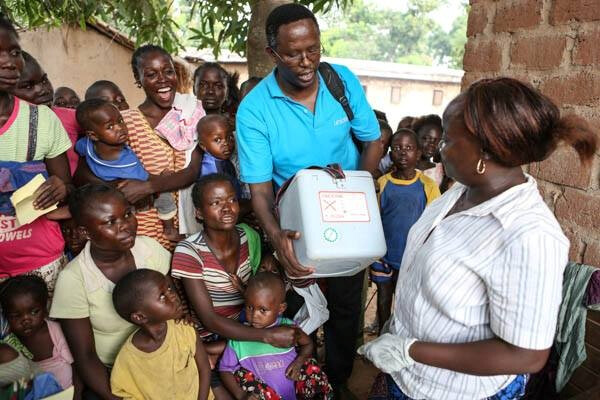
Bangui, Central African Republic – The Central African Republic (CAR) is escalating its campaign to eliminate polio, with a focused effort on reaching vulnerable populations in remote mining regions like Zoubala, located in the Bossombélé district. These areas pose unique challenges and a heightened risk of poliovirus transmission, necessitating targeted vaccination strategies.
The urgency of this initiative was underscored in 2023 when three cases of circulating variant poliovirus type 2 (cVDPV2) were detected in Bossembele, with two originating from the Gaga mining site. This outbreak prompted immediate action, including vaccination campaigns in Zoubala, one of the district's 34 mining sites.
Overcoming Logistical and Security Challenges
A crucial vaccination drive took place in Zoubala from October 10th to 13th, aiming to close the immunity gap among children aged 0 to 59 months. Brice Ngombe, a consultant with the World Health Organization (WHO) polio response program, highlighted the significant obstacles faced during the campaign.
"Mining sites are often situated in remote, security-compromised zones," Ngombe explained. "Communities here frequently lack access to basic health services, including routine vaccinations, resulting in a higher number of zero-dose children."
The vaccination teams navigated treacherous terrain, poor road conditions, and the potential presence of armed groups. The absence of reliable mobile network coverage further complicated real-time reporting and coordination.
Targeting High-Risk Zones
The focus on mining sites like Zoubala is critical due to several factors. These areas attract workers from diverse regions, including neighboring countries where poliovirus variants have been detected, increasing the risk of virus importation and transmission. The CAR has also faced challenges in its epidemiological surveillance, hindering its ability to promptly detect and respond to outbreaks.
Recent detections of new cVDPV2 cases have prompted the country to implement a comprehensive response plan, emphasizing enhanced vaccination and surveillance.
Successful Vaccination Campaign Despite Hurdles
Despite the challenges, the campaign achieved remarkable results. Nearly half a million children were vaccinated across the country, including 57 children in the Zoubala mining area. Notably, 17 of these children were zero-dose, demonstrating the success in reaching previously unvaccinated individuals.
"Polio knows no borders, and neither should our vaccination efforts," stated Dr. Ngoy Nsenga, WHO Representative in the CAR. "Reaching mining sites and other high-risk areas is crucial to ensure every child is protected from this devastating disease. We are working tirelessly with partners to deliver vaccines to those who need them most, even in the most remote locations."
Community Engagement and Collaboration
The campaign's success was driven by robust community engagement, with teams reaching over 350 families to educate them about the benefits of vaccination. Early engagement with community members and leaders fostered trust and raised awareness about the importance of immunization.
Collaboration across sectors played a vital role. Partnerships with NGOs like Cap Anamur, dedicated to assisting refugees and displaced people, and local authorities facilitated outreach and ensured smooth campaign execution. Teams also adapted their approaches to fit the unique contexts of mining communities, overcoming logistical challenges and boosting vaccine uptake.
Ongoing and Future Efforts
The CAR has intensified its efforts to interrupt cVDPV2 transmission, conducting two nationwide vaccination rounds in April and May 2024. Additional rounds are planned for the fourth quarter to sustain progress in boosting immunity among vulnerable groups. The second round preparation is underway and will target over 1 million children in four regions.
Furthermore, the CAR and Chad have strengthened their coordination efforts to prevent cross-border polio spread. Both countries have committed to joint planning, with coordination teams aligning vaccination strategies and sharing surveillance data. This collaborative approach enhances readiness and rapid response to emerging threats.
The ongoing commitment of the CAR government, WHO, and partner organizations underscores the determination to eradicate polio and protect the health of all children, especially those in high-risk and underserved communities.
[Copyright (c) Global Economic Times. All Rights Reserved.]






























